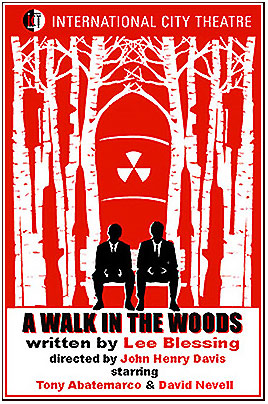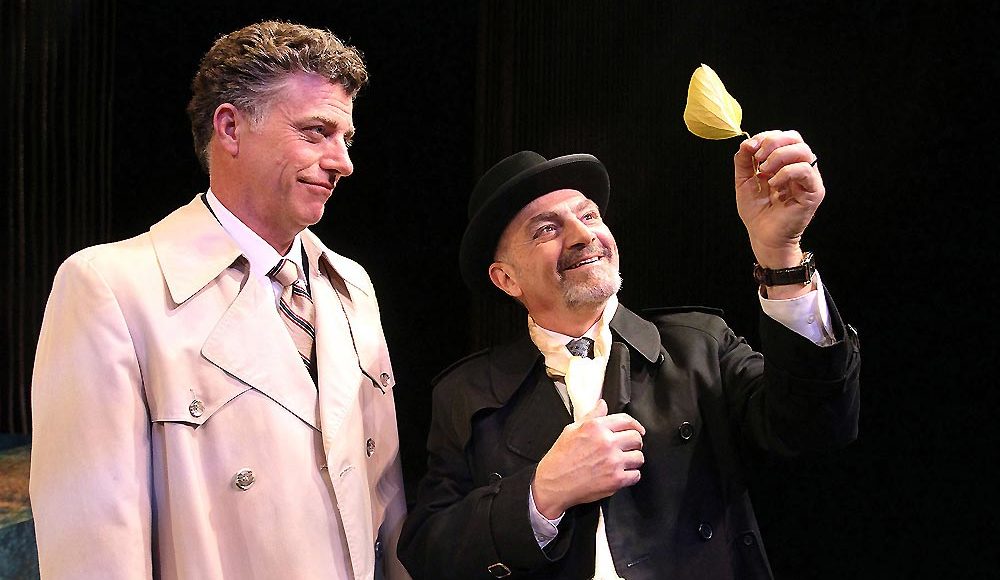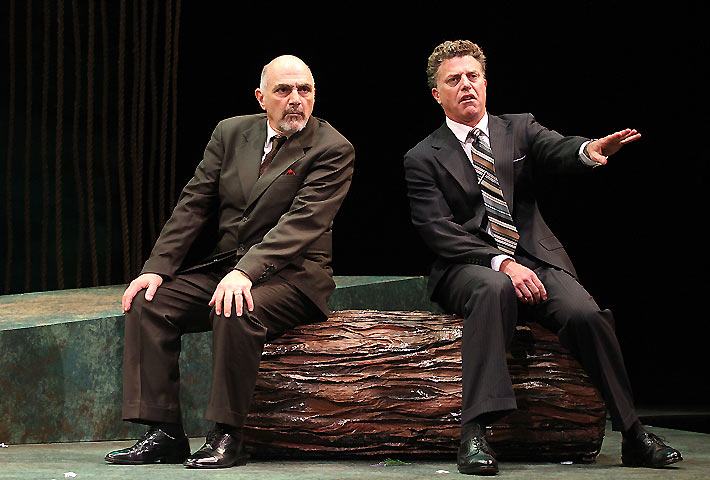The most disappointing feature of Lee Blessing’s succinct if a tad “lite” A Walk in the Woods now gracing the stage of Long Beach’s International City Theatre is its stubborn and annoying relevance.
Blessing has a Master’s Eye of seeing the potential of theatrical success in the flotsam of history, and A Walk in the Woods gives ample proof of that.
The play finds its inspiration from an event which took place in 1982 at a point in history that was nothing if not turbulent.
You could start it with the invasion of Afghanistan ordered by Soviet leader Leonid Brezhnev in December of 1979. In response to which, President Jimmy Carter imposed a number of trade sanctions against the Soviet Union, including an embargo on grain shipments which was a body blow to a nation utterly reliant on foreign imports to adequately feed its citizens. % Carter also withdrew American participation from the Moscow held Summer Olympics of 1980.
 U.S.-Soviet relations had come full circle. From the early, tense period of global confrontation following the end of World War II that had fostered the Korean War and the Bay of Pigs, to the détente era from the late ‘60s to the ‘70s, now in the first half of the 1980s the rigid attitudes of confrontation and deep suspicions began to reappear.
U.S.-Soviet relations had come full circle. From the early, tense period of global confrontation following the end of World War II that had fostered the Korean War and the Bay of Pigs, to the détente era from the late ‘60s to the ‘70s, now in the first half of the 1980s the rigid attitudes of confrontation and deep suspicions began to reappear.
It was in this global environment that two arms negotiators, Paul H. Nitze and Yuli A. Kvitsinsky, left the official conference talks being held in Geneva and took ‘a walk in the woods.” During this walk, the two men achieved a major breakthrough on the issue of arms reduction.
They both excitedly reported the initiative they had devised with this leap forward to their respective governments, and both of their respective governments immediately rejected that initiative. In 1983, the Soviets ended the talks.
Following Brezhnev’s death in 1982, Yuri Andropov assumed leadership of the Soviet Union and his continuation of Brezhnev’s policies only hastened the deterioration of relations between the two nations, a process which President Ronald Reagan contributed to, in both deed and word, cumulating in March 1983, with his publically denouncing the Soviet Union as the “evil empire.”
Worsening events followed hard on each others heal with the Soviet air force downing of a South Korean civilian airliner in September of 1983 and the US invasion of Grenada in October.
In 1985, Mikhail Gorbachev became General Secretary of the Soviet Union and it appeared the Cold War was finally nearing its end, and while walking in Moscow’s Red Square in 1988 President Reagan, when asked about his infamous “evil empire” remark, responded, “I was talking about another time, another era.”
It was at the tail end of this period that Blessing’s play depicting the relationship that develops between the stiff, dedicated American arms negotiator and his affable, if cynical Russian counterpart appeared in New York with Sam Waterston and Robert Prosky in the roles respectively.
The Play would be nominated for a Tony and be placed on the short list for the Pulitzer Prize for Drama and win neither.
Then in December of 1991, two years into the presidency of George H.W. Bush, the Soviet Union collapsed. This end of the Cold War was heralded as the commencement of a new era for global relations, with armed conflicts a thing of the past and ice cream and cake for everybody.
History has quickly put the lie to that optimism.
So the play that everybody thought was an epitaph for the tensions that gripped the world for over half a century was showed to be an ironic commentary on the resilience of hope in the face of man’s absurd intransigence.
Everything in the world is changing at a lightning speed, except for man who thinks like that subhuman brute he was back in the caves.
Director John Henry Davis is a work-horse director who has plodded along doing standard but solid work (End of the Rainbow for ICT) with the occasional stumble (Dr. Anonymous at the Zephyr – rather nasty stumble there!)
But plod along and eventually you’re bound to kick up a nice nugget of gold, and A Walk in the Woods is definitely that.
The ICT is one of my favorite venues; if one I hold to task for a tendency to pitch underhanded in their choice of plays, and the selection of Blessing’s play is no exception.
However unlike some of their past picks (Abigail/1702 jumps quickly to mind – very quickly) Blessing’s play does clean up well, and with Tony Abatemarco as the Russian Botvinnik and David Nevell as the uptight American Honeyman you can bring it out to meet the company, or in this case an audience.
Both Abatemarco and Nevell display their craft and their talents in skillfully reinforcing the human undercurrent of the work, which is just about all it has to offer. Director Davis displays the experience and intelligence in emphasizing this by keeping the two actors in constant view of the audience, such as indicating the seasonal changes by having them don the appropriate wardrobe from a coat rack on each side of the stage, to binding them with the actual shifting of the scenes, by littering the stage with fall’s leaves pulled from their pockets.
There is no real conclusion to the piece which has proved maddening to some directors, and there is not much of a story either, which has confounded some actors.
But Davis has zeroed in on what the play does offer; a snapshot of two men who are facing the dark forces of inhumanity.
Not only has Davis facilitated Abatemarco and Nevell in delivering two pitch-perfect performances, but he has succeeded in highlighting their efforts in beautiful stage veneer with the aid of Christopher Scott Murillo’s scenic design, Donna Ruzika’s lighting design and a sound orchestration by Jeff Polunas: three talents whose work we always find praiseworthy.
Davis applies their talents and his artistry to this play as an old-time cinematographer would apply Vaseline to a camera lens when shooting stars past their prime, and achieving the same desired effect; obscuring the natural flaws that are there while giving an aura to what remains.
I was in London for the 1988 production starring Alec Guinness as Botvinnik and Edward Herrmann as Honeyman. That production was plagued by Blessing’s soft shoulder of an ending through its run; at one point even trying to impose a firmer conclusion by having Honeyman give Botvinnik his ink pen as some sort of BFF token.
Frankly, I much prefer this staging, and though I think the production serves to exemplify both the strengths and weakness of ICT, nevertheless the strengths win out.
% Contrary to the Neo-con revisionist viewing of history, Carter was not one to kowtow to Soviet aggression, and in every way, other than public denouncements, took a far sterner stance towards the USSR than his predecessor. The grain embargo was a disaster for the Soviet Union. And stayed in place—that is until Reagan lifted it.
* * *
A Walk in the Woods runs now through May 22
Fridays and Saturdays at 8 p.m. and Sundays at 2 p.m.
INTERNATIONAL CITY THEATRE
Long Beach Performing Arts Center
330 East Seaside Way
Long Beach, CA 90802
For tickets and additional information
562-436-4610 or www.InternationalCityTheatre.org






